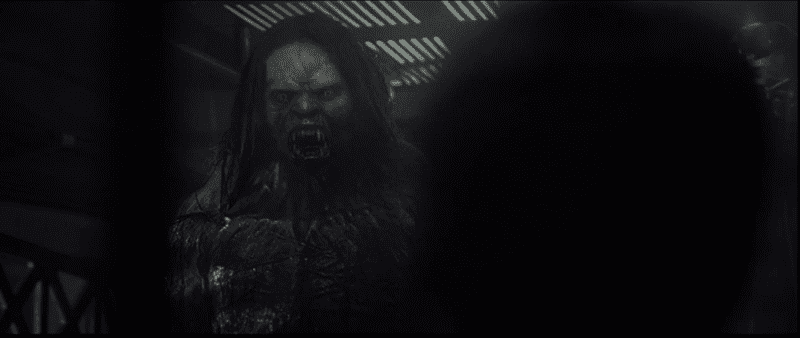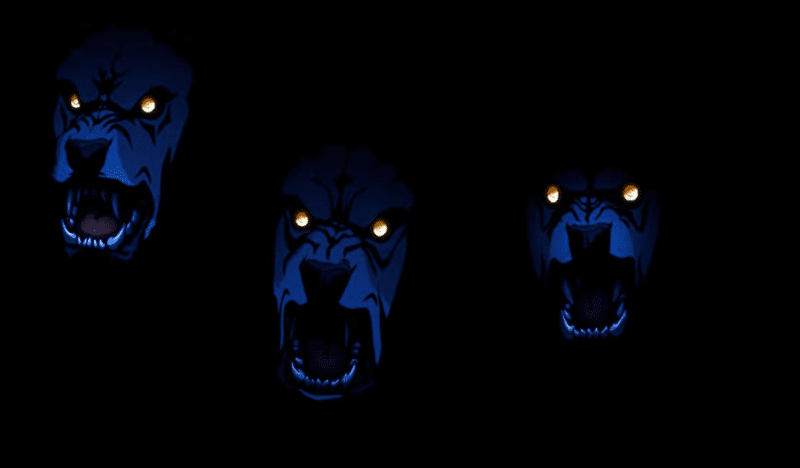Having previously composed music for projects like The Seasoning House (2012), Bunnicula TV series, and the werewolves-on-a-train film, Howl (2015), Paul Edward-Francis has also composed the mighty, majestic score to Netflix series, Blood of Zeus. Nominated for an Annie Award, the score definitely is a tasty ingredient to the series’ success. We decided to ask him a few questions about it and gained insights into the entertainment realm.
PopHorror: Blood of Zeus is not categorized as horror, but it seems like many epic tales have horror elements, that is, some scary stuff happening, including monsters. What kind of monsters are your favorite?
Paul Edward-Francis: Yes, genre-wise, Blood of Zeus touches upon a few. The horror elements really come into effect from Seraphim and his demonic army who play gruesome havoc on the village and its people. As a kid, I was always drawn more towards the supernatural. Maybe that’s because of the Indiana Jones and Ghostbusters franchises that I used to love. We had like four TV stations in the UK when I was growing up, so when an epic came on like Jason and the Argonauts, it was a pretty big deal.
I remember the first time I saw that film. I was blown away that something like this even existed, but when I saw Medusa, she completely terrified me. Working on Blood of Zeus, I really started to try and educate myself more on mythology. I’m not sure if Medusa is even classed as a monster. Perhaps that’s down to perception. Regardless, if you were up against her and fighting for your life, you would probably classify her as a monster, but to me, I just find her fascinating.
PopHorror: In an animated series or feature like Blood of Zeus, to what extent does the artwork influence music composition?
Paul Edward-Francis: Massively. I mean, it really does set the scene and tone just as much as visuals do in live-action. The artwork on Blood of Zeus is simply stunning. It was one of the first things that really struck me when seeing the animation for the first time. It’s incredibly inspiring when you see this mythological world so wonderfully brought to life and in many ways, you don’t want to let the team down. So, it gives you more motivation to try and match musically the amount of dedication in detail that is seen on screen.
PopHorror: Admittedly, I have not seen The Color of Magic, but it stars Tim Curry and has some epic-sounding music in the trailer. How does one keep hyped-up music sounding fresh?
Paul Edward-Francis: We didn’t really have anything to do with the trailer. The Color of Magic was pretty much one of the first scores I did. I was asked by another composer [David A. Hughes] to come in and write a few scenes on an adaption called the Hog-father for Sky TV in the UK. Anyway, it did pretty well, so they went ahead with the follow-up The Color of Magic.
I was given more to do on this one, and I stay proud of some of the themes I wrote, but I think it’s fair to say with experience, I might tackle it a little differently now. Regardless, I think good music will always stay and feel fresh in a timeless way. Look at The Planets suite by Gustav Holtz for instance. It was composed in 1916 and is still inspiring composers to this day.
Is Less More In Scoring Horror?

PopHorror: Howl is a werewolf-based horror movie, and its score seems more subtle than in Blood of Zeus. Do you think horror typically benefits from a less-is-more approach to the score?
Paul Edward-Francis: I would say it depends on a few factors. Horror music in film is forever evolving and it needs to. If you look back at the Hammer horror days, most people would now see the music as being cheesy, but it is a product of its time. I do feel modern horror music is more effective when used sparingly. It can almost become a source of comfort if there is too much of it. In a sense, you cannot reinvent the wheel, but I do believe there are techniques that are yet to be explored musically in horror. I mean, the aim is to make the viewer feel out of their comfort zone, and I think there are a few tricks to achieve this that would involve more collaboration from the composer, sound design, and dub mix team.
PopHorror: What are some of your favorite horror and non-horror films and TV shows?
Paul Edward-Francis: Wow, where do I start? Right off the bat, I love science fiction. I loved Denis Villeneuve’s Blade Runner as well as the original, of course. I’m basically a product of the ’80s, so anything Spielberg/Lucas-related. More recently, I loved Ozark and Succession. Just both incredibly well-written shows. Horror-wise, I really enjoyed Doctor Sleep [read the PopHorror review here], and I will always have a soft spot for the original The Wicker Man.
PopHorror: How much room is there for discovery in music, or do you think it’s all basically been done?
Paul Edward-Francis: Again, I think it’s more evolution than revolution. New techniques will always come into play. Whether that be musical or technological, advancements will always be made. Take for example a musical technique called Spiccato, which is a bowing technique for string instruments. It’s a technique that was really made popular by Hans Zimmer after the Batman films. Now it’s been used in pretty much every action sequence for the last fifteen years and has been used in some unique and original ways. So, it’s inevitable that will happen again at some point.
The Arts Will Always Evolve

PopHorror: Here I’ll repeat that last question, but for movies and TV shows.
Paul Edward-Francis: Of course. Again, as technology advances and becomes more accessible, it will inevitably lead to more creative freedom behind the camera. In effect, it will also allow filmmakers to realize their potential in a way that wasn’t possible due to budgetary restraints. I think our attention and priorities as filmgoers are also forever changing. In the ’90s, gangster films were all the rage, and then came along the comic book adaptations and switched things up again. Then, more recently, we have Joker and look at the response it received. An old school character study that felt fresh and new. The arts will always evolve.
PopHorror: Are there any things you tend to avoid compositionally?
Paul Edward-Francis: Not really. If I can avoid the obvious clichés I will, but there is an argument to be made that there are no right or wrongs when it comes to music. I recall when I was younger and just starting out as a budding composer. My father was an accomplished arranger/orchestrator, and he was working on a project where he was having to transcribe the music from a Nelson Riddle arrangement. I asked how it was going, and he said in regards to the arranger, “He is doing things musically that just shouldn’t work, but they do.” That stuck with me. I think what I took from it was not only to be adventurous, but there is no right or wrong.
PopHorror: Do you have a favorite among all the Greek myths?
Paul Edward-Francis: Again, the story of Medusa is one that really struck me. I think because she captured my attention and scared me so much as a kid, it was really quite haunting to learn of her backstory and how she became this legend. There are so many great stories within Greek mythology, and I think that’s what Charley and Vlas did so fantastically well when writing Blood of Zeus. They essentially created an original story that you could slot right next to the tales of old and have stand side by side with all these great classic mythological stories. I think that’s a real testament to what a great story and world they created.
PopHorror: What future projects do you have planned?
Paul Edward-Francis: Well, we have season two coming up for Blood of Zeus that I cannot wait for. We also have had the soundtrack released for Blood of Zeus as well on digital, and on the 17th of April, we are releasing a vinyl copy courtesy of Sony Music for Record Day.
We would like to thank Paul Edward-Francis for answering our questions!
 PopHorror Let's Get Scared
PopHorror Let's Get Scared



